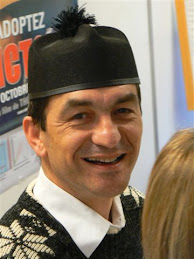We must protect children: This conviction is based partly upon an immense insult to the adult, an inconsolable wound, that of lost innocence.
Translated By Hodna Nuernberg - 20 March 2010
Edited by Patricia Simoni
When I stay in the United States, it’s bizarre, I never come across children. No children in the streets, never a child alone. Always accompanied by an adult. Is the child a protected species? Protected from what?
I underwent a mandatory training there in order to learn how to avoid every risky situation, in other words, any special relationship with a child. Never be alone in a room with a minor — leave the door open — or obtain the presence of another adult. I had to understand that, here, children are potential prey.
Because predators, that’s us, the adults, the educators, the volunteers. All obsessed. All have the potential of abusive behavior toward children. Sexual abuse, inappropriate touching, the utilization of authority, unsuitable words that can constitute an attack for the child. You didn’t know? That training was there precisely to warn us of everything that must be avoided, everything for which you could be sued.
This country is completely traumatized by child abuse. Scandals have erupted everywhere. It’s a pain for everyone. But I’ve saved the best part for you. Because the worst child predator, the proven danger, is the priest! It took me some time to understand that I am a potential criminal.
All that made me quite uncomfortable. I had to convince myself, in order to adopt the appropriate behavior, that any situation in which I was alone with a minor presents a potential risk. So, I’ve learned. “Warning: Children.”
Ordinarily, this warning was intended to protect children from potential risks: leaving school, getting off the bus, at the playground. But I learned that “Warning: Children” can also mean, warning, a risk for me, the adult’s warning, monitor all your movements. So, I’ve learned. In order to protect myself, I learned to step into the skin of a predator or of a reformed sexual offender.
If I am at a friend’s house, I take care to never be alone with a child. I try to follow the adults around, from a visit to the kitchen, from the refrigerator to the sink. And, if it’s necessary, even to the bathroom. If I call my friends and one of their children answers the phone I hang up immediately, fearing… well, you never know!
I call back until I hear the voice of one of the parents. When I come across a child, I take a detour, fearing that something about my attitude might be interpreted as threatening or abusive. Potential accusations are everywhere.
I have been imprudent. I have sometimes lacked judgment. Fortunately, without consequences. It is necessary to pay attention. Lives have been destroyed by accusations. Even in France, we’ve seen defendants commit suicide in the wake of their prosecution based upon accusations… which ultimately proved to be false.
Protecting children is a priority. A global priority. Children are vulnerable, innocent. They deserve the protection of society. Children are our future; it is in them that we project our dreams of success; they are the object of all our love. Children are our resurrected ambitions, a renewed life for our withered purity. Children are redemption made into flesh, which we take care of day after day. Protecting children is a priority.
Adults, on the other hand, are insidious perversion, saving face by disguising their cracks. Adults are the compromise with impurity.
We must protect children: This conviction is based partly upon an immense insult to the adult, an inconsolable wound, that of lost innocence. Within this is a refusal to mature. Because, yes, adults no longer have that childish innocence. Is it necessary to attribute so many nefarious intentions to adults? Is it necessary to make predators of them?
Note: Antoine Carlioz is a cancer researcher in the hospitals of Marseilles and a priest of the Community Mission of France.


Aucun commentaire:
Enregistrer un commentaire